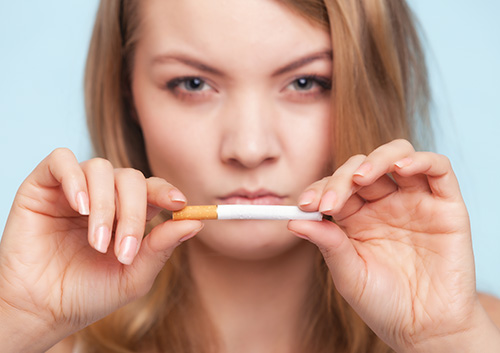Helpful Hints for Dealing with Braces Pain
April 12th, 2017

Your first few days with braces will feel rather odd, awkward, and even painful. The day you get your braces you will probably just feel weird, like you have something in your mouth – because you do. You are most likely to feel pain and soreness during the second and third days. After that, you should be fine. If you experience any pain with your braces, there are a few things you can do to get some relief.
Home Remedies
Rinsing your mouth with warm salt water will soothe it and promote healing. Rinse several times a day or when your mouth, particularly mouth sores, are hurting. You can also take some Tylenol every four hours. Dr. Elena Iacob and our team advise against products that contain ibuprofen because it slows down the movement of your teeth.
You can also eat cold foods like ice cream or yogurt. The cold of the food will help dull the pain. Ice packs applied to your mouth help as well. You can also swish ice water around your mouth, but DO NOT eat ice!
Cool Products
Products for canker sores can be applied to the mouth sores you develop from your braces. There are also various rinses you can use that act as a shield or barrier in your mouth, and protect your mouth sores from further irritation.
Dr. Elena Iacob and our team may have given you some dental wax to put on the abrasive areas of your braces to protect your mouth. Putting dental wax on the brackets creates a barrier that keeps your mouth from getting scraped and sore.
Bite wafers are another great pain relief too. When you bite down on the wafer, it increases circulation in your gums, which can ease the pain a bit. Just a little pressure will work; you don’t want to bite too hard. And they usually come in cool colors, too!
The pain won’t last forever. One day you will wake up and you won’t have any pain. In fact, you probably won’t even notice the braces in your mouth at all!
April is National Facial Protection Month
April 5th, 2017

The Importance of Facial Protection
Americans from all walks of life should mark April as National Facial Protection Month on their calendars. The American Association of Pediatric Dentistry, Academy for Sports Dentistry, American Academy of Pediatric Dentistry, and American Association of Oral and Maxillofacial Surgeons have combined forces to sponsor this annual campaign, which aims to educate and remind us of the importance of protecting our face and teeth against impacts and injuries.
Wearing a helmet can save your life and prevent devastating physical damage in a variety of situations, from playing football to riding a bicycle. According to the American Association of Oral and Maxillofacial Surgeons, helmets reduce the risk of various head injuries by as much as 85 percent. Whether helmet laws apply in your area or not, Dr. Elena Iacob and our team at Dr. Elena S. Iacob want you to make sure you and your loved ones wear helmets with the appropriate safety ratings for specific activities. (A sticker on or inside the helmet will usually indicate this rating.) Helmets can also help save your teeth if they come with an attached faceguard, an essential addition for football players and others involved in contact sports.
Preventing Dental Injuries
A mouthguard can protect you against a variety of dental injuries, such as cracked, broken, or knocked-out teeth. The American Dental Association states that mouthguards play an essential role in preventing up to 200,000 dental injuries each year, and many states mandate their use for sports activities such as football and hockey. The Academy for Sports Dentistry warns, however, that these mouthguards must be custom-fitted as precisely as possible to prove effective. Have a professional-quality mouthguard molded and fitted by our team at Dr. Elena S. Iacob for better protection than a generic store-bought or “boil-and-bite” variety can offer. These cheaper versions tend to wear out quickly, interfere with proper breathing, and provide uneven degrees of cushion against impacts. Always have a fresh mouthguard fitted for each new sports season.
Choose the right combination of helmet, faceguard, and mouthguard to protect your teeth and face this April, and tell your friends to do the same! To learn more about mouthguards, or to schedule an appointment with Dr. Elena Iacob, please give us a call at our convenient Frisco office!
Does smoking affect oral health?
March 29th, 2017

By now, everyone knows that smoking is bad for you. But the truth is its broad-reaching health effects are not all known by everyone. This is especially true of oral health. Smoking can have serious repercussions in this regard. To give you a better idea of how smoking can affect your oral health, Dr. Elena Iacob and our team have listed some issues that can arise.
Oral Cancer
Oral cancer can have steep ramifications for anyone that gets it. Surgery can be required to eliminate the cancer before it spreads to more vital parts of your body. Any type of cancer is about the worst health effect you can get, and this especially holds true to the affects that smoking has on your mouth. The type of mouth surgery required with oral cancer can leave your face deconstructed in certain areas, and it is all due to smoking or use of other tobacco products.
Tooth Discoloration and Bad Breath
At the very least, it is fair to say that as a smoker you will often have bad breath, and while you may try to cover it up with gum or mints, tooth discoloration is a whole other story. The chemicals and substances in cigarettes stick to your teeth staining them brown and yellow colors that are increasingly difficult to disguise.
Gum Disease and Loss of Bone
Another effect of smoking is the increased risk of gum disease. Your gums may start to recede, which can eventually lead to the loss of teeth. Smoking can also increase bone loss and density in your jaw which is vital to the health of your mouth. Gum disease and bone loss are two signs that smoking is definitely bad for your mouth.
When it comes to the health of your mouth, the question is not whether smoking affects your health, it's how does it affect your health and to what degree. If for no other reason than because smoking involves your mouth as its entry point, it is safe to say that it can have long-lasting and detrimental consequences on your oral health.
To learn more about smoking and your oral health, contact our Frisco office to schedule an appointment with Dr. Elena Iacob.
Common Issues with Braces: How to avoid bad breath
March 22nd, 2017

A bright, beautiful smile is often achieved with braces. The time you spend wearing braces is an investment in the good health and appearance of your smile. However, Dr. Elena Iacob and our staff know that having braces on your teeth can pose challenges. Many of these challenges are commonly faced by all who wear braces, such as flossing, getting food stuck in your braces, and bad breath.
Today, let’s address bad breath and what to do about it. There’s no reason you have to shy away from conversation for fear that you’ve got bad breath.
Fresh Breath Tips for Braces Wearers
- Eat a Healthy Diet. Unhealthy foods that are laden with sugar can contribute to bad breath. Stick with healthy produce, protein, grains, and dairy found on the list of foods your orthodontist says are safe to eat with braces.
- Drink Non-Sugary Beverages. Likewise, steer clear of sugary sodas and juices for the same reason. They contribute to bad breath.
- Stay Hydrated. A mouth that’s continually dry can lead to bad breath by inhibiting your production of saliva. Regular production of saliva removes bacteria and excess food from your mouth, both of which cause bad breath.
- Brush Often. Brush your teeth and tongue first thing in the morning, after each meal and snack, and before you go to bed, to remove food particles and bacteria that cause bad breath.
- Don’t Forget to Floss. Flossing with braces might seem tricky, but it is a necessity. Ask Dr. Elena Iacob to show you the best way to floss effectively with braces.
- Mouthwash Use. Use the mouthwash recommended by Dr. Elena Iacob. For the best results, swish the mouthwash around in your mouth for 30 seconds.
- Get Regular Cleanings. Regular dental exams and cleanings are more important when you have braces. Cavities can delay your treatment progress, so be sure to visit your dentist every six months.
Practice Good Hygiene Daily
Good oral hygiene practices are important every day, whether you wear braces or not. But they become even more important during the months you wear braces. In addition to your regular orthodontic checkups, see your general dentist for cleanings and exams.
Together, you and our Frisco team will keep your mouth healthy and fresh during and after your orthodontic treatment.






